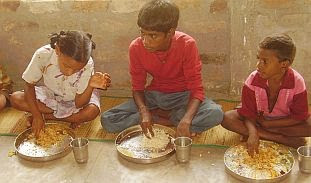The common argument is that you should teach one to fish, not hand out fish to them.
I of course agree with the crux of this argument. Who wouldn’t? But when you look a little closer at the issue, you soon realize that there are situations where one must hand out fish first. There are also situations where one simply cannot teach to fish .
For example, take the target segments of Srishti Annam. Our mandate is to give the gift of life to people who have absolutely no other means of sustaining themselves.
Over 70% our "special guests" are above 60 years of age, typically very frail, with ailments, illiterate - your typical road side aged beggars in India. When one lived like they did, above 60 is equivalent to above 75 years for the fortunate few.

How do we "teach to fish" in this case? We must first feed, and for a large percentage of persons just continue to simply feed and take care of them. For those who can work, we do motivate them to commit to some non-strenuous work like gardening, washing dishes, etc.
The other segment is very young children aged 1-10. They are either orphaned or abandoned with grandparents.

Not being "attractive" to CSR grants is a severe limitation for a young charitable activity like Srishti Annam. But how can we fix this without altering our original objective of hunger mitigation for the utterly destitute?
Mature societies have long realized that it is the society / community’s responsibility to take care of certain people’s basic needs - for example spiritual aspirants, helpless old people, very young children, etc. By making it a social responsibility to feed these segments, compassion and care are nurtured not only the in the fed but also in the feeders. This is why annadanam (free feeding of the needy) has long been recognized as the highest of form of charity in India.
But how do we pitch that to corporate CSR committees?
(If you have suggestions, we would LOVE to hear from you.)
No comments:
Post a Comment